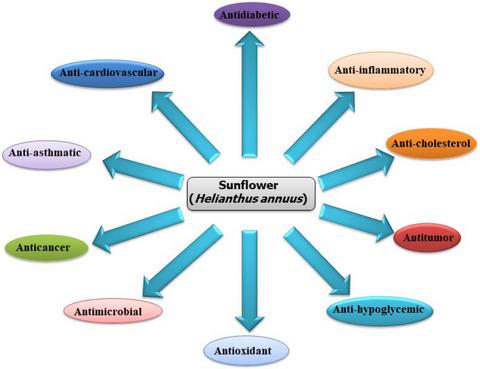当前位置:
X-MOL 学术
›
Food Sci. Nutr.
›
论文详情
Our official English website, www.x-mol.net, welcomes your
feedback! (Note: you will need to create a separate account there.)
Oilseed crop sunflower (Helianthus annuus) as a source of food: Nutritional and health benefits
Food Science & Nutrition ( IF 3.5 ) Pub Date : 2020-07-31 , DOI: 10.1002/fsn3.1783 Bartholomew Saanu Adeleke 1 , Olubukola Oluranti Babalola 1
Food Science & Nutrition ( IF 3.5 ) Pub Date : 2020-07-31 , DOI: 10.1002/fsn3.1783 Bartholomew Saanu Adeleke 1 , Olubukola Oluranti Babalola 1
Affiliation

|
The use of biofertilizers in developing environmentally friendly agriculture as an alternative to chemical‐based fertilizers in enhancing food production is promising in sustainable agriculture for the improvement in the yield of some commercial crops such as sunflowers and other oilseed crops in terms of quality and quantity. Sunflower is an important oilseed crop native to South America and currently cultivated throughout the world. Generally, the sunflower is considered important based on its nutritional and medicinal value. Due to its beneficial health effects, sunflower has been recognized as functional foods or nutraceutical, although not yet fully harnessed. Sunflower contains mineral elements and phytochemicals such as dietary fiber, manganese, vitamins, tocopherols, phytosterols, triterpene glycosides, α‐tocopherol, glutathione reductase, flavonoids, phenolic acids, carotenoids, peptides, chlorogenic acid, caffeic acid, alkaloids, tannins, and saponins; and these compounds contribute to their functional and nutraceutical development. The extract from sunflower is known to be a potential source of antimicrobial, anti‐inflammatory, antitumor, and antioxidants agents that protect human cells against harmful reactive oxygen molecules and pathogenic microorganisms. Also, the pharmacological survey on sunflower had revealed its curative power to different kinds of diseases. The health benefits of sunflower include blood pressure and diabetic control, skin protection, and lowering cholesterol and other functions. This review is written with appropriate referencing to previously published work and provides updated information regarding the new method of organic farming for sunflower production, nutritional and health benefits, and its by‐products as human diet and livestock feed. Also, the constraints of sunflower production are elucidated.
中文翻译:

油料作物向日葵(Helianthus annuus)作为食物来源:营养和健康益处
使用生物肥料发展环境友好型农业,作为化学肥料的替代品,提高粮食产量,在可持续农业中有望提高向日葵和其他油籽作物等经济作物的产量和质量。向日葵是一种重要的油籽作物,原产于南美洲,目前在世界各地种植。一般来说,向日葵因其营养和药用价值而被认为很重要。由于其有益的健康作用,向日葵已被认为是功能性食品或营养保健品,尽管尚未得到充分利用。向日葵含有膳食纤维、锰、维生素、生育酚、植物甾醇、三萜苷、α-生育酚、谷胱甘肽还原酶、黄酮类、酚酸、类胡萝卜素、肽、绿原酸、咖啡酸、生物碱、单宁和皂苷等矿物质元素和植物化学物质。 ;这些化合物有助于其功能和营养保健的发展。众所周知,向日葵提取物是抗菌、抗炎、抗肿瘤和抗氧化剂的潜在来源,可保护人体细胞免受有害活性氧分子和病原微生物的侵害。此外,对向日葵的药理研究也揭示了它对多种疾病的疗效。向日葵的健康益处包括血压和糖尿病控制、皮肤保护、降低胆固醇等功能。 这篇评论的撰写适当参考了之前发表的作品,并提供了有关向日葵生产的有机农业新方法、营养和健康益处及其作为人类饮食和牲畜饲料的副产品的最新信息。此外,还阐明了向日葵生产的限制因素。
更新日期:2020-09-20
中文翻译:

油料作物向日葵(Helianthus annuus)作为食物来源:营养和健康益处
使用生物肥料发展环境友好型农业,作为化学肥料的替代品,提高粮食产量,在可持续农业中有望提高向日葵和其他油籽作物等经济作物的产量和质量。向日葵是一种重要的油籽作物,原产于南美洲,目前在世界各地种植。一般来说,向日葵因其营养和药用价值而被认为很重要。由于其有益的健康作用,向日葵已被认为是功能性食品或营养保健品,尽管尚未得到充分利用。向日葵含有膳食纤维、锰、维生素、生育酚、植物甾醇、三萜苷、α-生育酚、谷胱甘肽还原酶、黄酮类、酚酸、类胡萝卜素、肽、绿原酸、咖啡酸、生物碱、单宁和皂苷等矿物质元素和植物化学物质。 ;这些化合物有助于其功能和营养保健的发展。众所周知,向日葵提取物是抗菌、抗炎、抗肿瘤和抗氧化剂的潜在来源,可保护人体细胞免受有害活性氧分子和病原微生物的侵害。此外,对向日葵的药理研究也揭示了它对多种疾病的疗效。向日葵的健康益处包括血压和糖尿病控制、皮肤保护、降低胆固醇等功能。 这篇评论的撰写适当参考了之前发表的作品,并提供了有关向日葵生产的有机农业新方法、营养和健康益处及其作为人类饮食和牲畜饲料的副产品的最新信息。此外,还阐明了向日葵生产的限制因素。











































 京公网安备 11010802027423号
京公网安备 11010802027423号